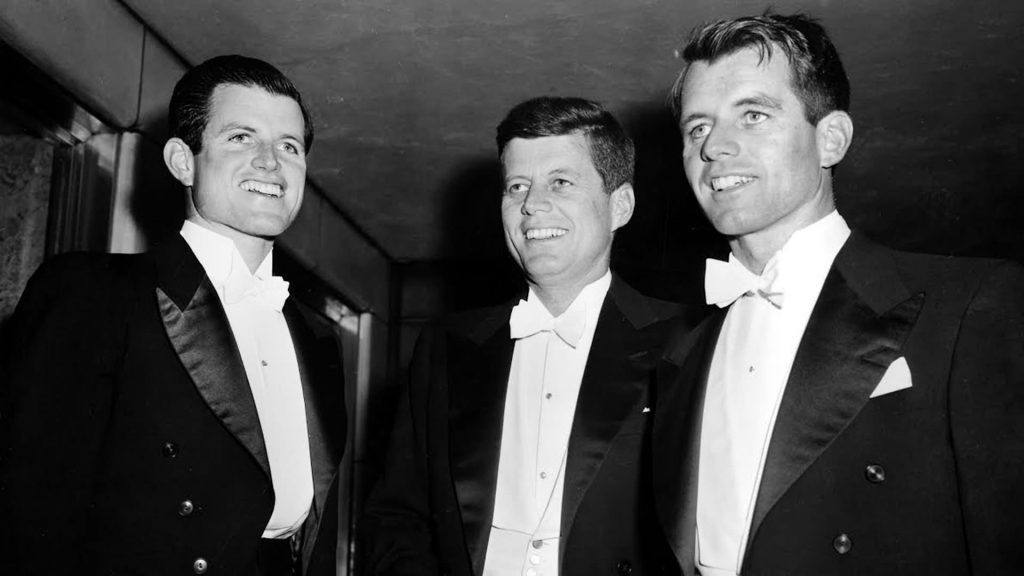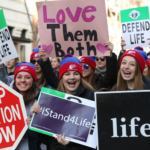Blog Post
How a handful of liberal Catholic theologians persuaded the Kennedys to support abortion
By Jonathon Van Maren
At 12:30 PM Central Standard Time fifty-five years ago today, a section of President John F. Kennedy’s head was blown away by a sniper as he drove through Dealey Plaza in an open motorcade in Dallas, Texas. Minutes before, the fourteen-year-old Jenyce Gush had been standing on the curb with a friend on Lemmon Avenue as the black car glided past to rousing cheers. “I could have reached out and touched the car,” she told me. “We seen him, with his real bushy eyebrows, seen Jackie, in her gorgeous pink and navy suit. I remember thinking how her lipstick matched the pink perfectly…I had these big pink plastic rollers in my hair, and I remember he looked at me and kind of raised his eyebrows, and I thought Jackie probably thought, Oh, so these are Texas girls.”
Gush headed home with her friend (they’d skipped school to see the Kennedys—Gush’s mother, ironically, worked as a waitress at Jack Ruby’s Carousel Club), and an hour later decided to run out to the drugstore. Sitting in a parked car, slapping the steering wheel, they saw a woman crying hysterically, saying over and over, “I can’t believe this happened in Dallas…not in Texas.” Gush asked the woman if there was something she could do to help, and the tearstained woman turned to her in horror: “Haven’t you heard? They’ve shot the president!” Gush didn’t believe her: “I just saw them!” She found a TV in a nearby pharmacy, and Walter Cronkite was announcing the news: John F. Kennedy was dead. “You could feel it,” she told me. “Darkness descended on Dallas.”
Since that fateful day in 1963, the tragic and glamorous Kennedys have entered into the political pantheon of those doomed to die young, with lives unfinished and questions unanswered. Teddy Kennedy, who died an old man in 2009, was the only Kennedy brother who did not perish violently: Oldest brother Joe Kennedy was killed in action in World War II, and Robert F. Kennedy was murdered five years after John in a California hotel, just after winning that state’s primary on what might have been his path to the presidency. The murdered Kennedys—martyred, in the eyes of their devotees—have become figures onto which people project their fondest hopes and questions of “what if,” despite inconvenient historical realities.
I discovered this devotion several years ago when I wrote a column on abortion in the lives of famous people, noting that one of JFK’s mistresses, Judith Campbell Exner, reported aborting a child she conceived with the president the same year he was shot. Some people responded with defensive incredulity to the idea that JFK would have been having an affair, in the first place. One elderly woman informed me angrily that JFK’s well-documented infidelities must have been made up, because the president had a bad back. This particular rebuttal was a tad ironic, since Marilyn Monroe once purred that she thought she made the president’s “back feel better.”
But it is interesting to look back at the Kennedys as the political family that straddled eras—a Catholic clan where the men chased skirts, the women were expected to raise the children, and the ruthless pursuit of power was the family business. Many have wondered what the Catholic Kennedys would have thought about abortion, a subject that was just beginning to surface in the Sixties and would begin to tear the country apart in the Seventies. As abortion was not an issue during the Kennedy presidency, there is only one comment we know of that JFK made referencing it, in relation to population control: “Now, on the question of limiting population: as you know the Japanese have been doing it very vigorously, through abortion, which I think would be repugnant to all Americans.”
Interestingly—especially when you consider Senator Ted Kennedy’s later opposition to Supreme Court nominees who opposed abortion and his willingness to go to great extremes to slander good men like Judge Robert Bork in order to keep them off the bench—the 35th president of the United States does have something of a judicial pro-life legacy. It was JFK who appointed Byron White to the Supreme Court, and it was Justice White that wrote the dissent in 1973’s tragic Roe v. Wade case that, with Doe v. Bolton, legalized abortion in all fifty states. Justice White’s dissension, in which he was joined by Justice William Rehnquist, is the only sane part of the entire ruling. The Kennedy who put White on the court did not live to see the Kennedy who became known as the “liberal lion” of the Senate condemn pro-life judges as dangerous misogynist bigots.
Of course, Teddy Kennedy wasn’t always an abortion extremist—that came with time. In fact, back in 1971, the young senator wrote a letter to a Massachusetts constituent expressing quite a different view: “While the deep concern of a woman bearing an unwanted child merits consideration and sympathy, it is my personal feeling that the legalization of abortion on demand is not in accordance with the value which our civilization places on human life. Wanted or unwanted, I believe that human life, even at its earliest stages, has certain rights which must be recognized—the right to be born, the right to love, the right to grow old…Once life has begun, no matter at what stage of growth, it is my belief that termination should not be decided merely by desire.”
So what happened? How did Ted Kennedy transform from a man who wrote that letter to the man who would viciously attack Supreme Court nominees for holding those precise views? Sadly, the Wall Street Journal revealed some years ago that it was a concentrated effort by a number of Catholic theologians to convince the Kennedys that support for abortion was acceptable. By convincing the Kennedy scions that it was moral to support abortion, these liberal priests had a tremendous impact on American politics: The Kennedys led the way for other public Catholics to claim that there was no contradiction between their professed Catholicism and their support for legal abortion (Joe Biden, Nancy Pelosi—the list goes on.) This came as welcome news to many politicians, as the Democrats became aware that the abortion lobby was willing to sink a lot of cash behind candidates that would serve their interests—and that even pro-life Catholic priests and bishops were increasingly withdrawing from the public culture wars, thus decreasing the chance that they would come out and publicly condemn a pro-abortion Catholic Democrat.
In fact, the Wall Street Journal reported, in “some cases, church leaders actually started providing ‘cover’ for Catholic pro-choice politicians who wanted to vote in favor of abortion rights. At a meeting at the Kennedy compound in Hyannisport, Mass., on a hot summer day in 1964, the Kennedy family and its advisers and allies were coached by leading theologians on how to accept and promote abortion with a ‘clear conscience.’ The former Jesuit priest Albert Jonsen, emeritus professor of ethics at the University of Washington, recalls the meeting in his book The Birth of Bioethics. He writes about how he joined with the Rev. Joseph Fuchs, a Catholic moral theologian; the Rev. Robert Drinan, then dean of Boston College Law School; and three academic theologians, the Revs. Giles Milhaven, Richard McCormick and Charles Curran, to enable the Kennedy family to redefine support for abortion.”
Jonsen noted that the meetings at Hyannisport were also “influenced by the position of another Jesuit, the Rev. John Courtney Murray, a position that ‘distinguished between the moral aspects of an issue and the feasibility of enacting legislation about that issue.’ It was the consensus at the Hyannisport conclave that Catholic politicians ‘might tolerate legislation that would permit abortion under certain circumstances if political efforts to repress this moral error led to greater perils to social peace and order.’”
Giles Milhaven would later recall the meeting at Hyannisport at a 1984 breakfast speech for Catholics for a Free Choice: “The theologians worked for a day and a half among ourselves at a nearby hotel. In the evening we answered questions from the Kennedys and the Shrivers. Though the theologians disagreed on many a point, they all concurred on certain basics…and that was that a Catholic politician could in good conscience vote in favor of abortion.” Robert F. Kennedy would be the first Kennedy to come out in support of abortion, being one of the only leading Catholic New York Democrats to support Republican Governor Nelson Rockefeller’s move to legalize abortion in some circumstances.
The Kennedy clan was the hinge on which Catholic Democrats could swing towards support for abortion, and they did so with a vengeance—keep in mind that at this point, the Republican Party was not a pro-life party, and it would take years of dedicated activism and politicking by activists such as Phyllis Schlafly before it would be. The Kennedys were genuinely concerned, at first, that political support for abortion could be immoral. It was liberal Catholic theologians that persuaded them otherwise—and by doing so, changed the American political landscape permanently. If the Kennedy family had instead been persuaded that support for abortion was immoral, who can say how the ensuing culture wars would have gone? The political landscape, at the very least, would look much different today.
Abortion is now, as the Wall Street Journal put it, a “Kennedy dogma.” JFK’s daughter Caroline has voiced her strong support for abortion, as has Kerry Kennedy Cuomo and Maryland’s former Lt. Gov. Kathleen Kennedy Townsend. The late Teddy Kennedy, of course, became a renowned abortion extremist, even taking the stage at the Democratic Convention in 2000 to promise the crowd that his party would defend abortion right up until birth. Congressman Joe Kennedy III, the family’s current political torchbearer (and RFK’s grandson), is a staunch and vocal supporter of abortion, and clearly has ambitions to live up to the family name. All of this is despite the fact that historians agree that there is no evidence that JFK—the only Kennedy to make it to the Oval Office—was pro-abortion, despite his shamefully promiscuous lifestyle.
Not all of the Kennedys were seduced by the slippery moral relativism of the liberal theologians that sought to persuade their family to abandon the pro-life ethic. Eunice Shriver, the sister of John, Bobby, and Teddy, remained, with her husband Sargent, an old-guard pro-life liberal to her last. “Because of Eunice Shriver’s work with the developmentally disabled, a group of Americans who had once been marginalized and hidden away,” wrote Ross Douthat in his New York Times eulogy, “or lobotomized, like her sister Rosemary—was ushered closer to full participation in ordinary human life. But because of laws that her brother unstintingly supported, that same group was ushered out again: the abortion rate for fetuses diagnosed with Down syndrome, for instance, is estimated to be as high as 90 percent.”
In fact, Douthat notes, it was Eunice Shriver, the Kennedy clan’s sole prominent defender of pre-born children, who in 1992 “participated in the last significant effort to push the Democratic Party away from abortion on demand, petitioning her party’s convention to consider ‘a new understanding’ of the issue, ‘one that does not pit mother against child,’ but instead seeks ‘policies that responsibly protect and advance the interest of mothers and their children, both before and after birth.’” On July 24, 1992, Eunice and Sargent Shriver, along with Pennsylvania Governor Bob Casey and other pro-life leaders, signed their names to a full-page ad in the New York Times titled “The New American Compact”:
We can choose to reaffirm our respect for human life. We can choose to extend once again the mantle of protection to all members of the human family, including the unborn. We can choose to provide effective care of mothers and children. And if we make those choices, America will experience a new birth of freedom, bringing with it a renewed spirit of community, compassion, and caring.
Shriver’s public advocacy on behalf of society’s most vulnerable members had begun during her brother’s presidency, when she revealed her sister Rosemary’s condition to the entire nation in a 1962 column for the Saturday Evening Post: “Early in life, Rosemary was different. She was slower to crawl, slower to walk and speak…Rosemary was mentally retarded.” Rosemary, who spent much of her life in an institution in Wisconsin before passing away at age 86 in 2005, was the inspiration for much of her sister’s impressive work: Shriver, according to the Washington Post earlier this year, “catalyzed much of the public and private research over the past six decades into developmental disabilities and how to cope with them. In no small part through her efforts, the average life span of a child born with Down syndrome more than tripled, from 19 years to 60.”
Eunice Shriver died at age 88 in August of 2009, just two weeks before her brother Teddy also departed. It is hard not to imagine what the American political landscape might have looked like if the Kennedys had chosen the path of Eunice rather than that of Teddy. Who knows what might have been accomplished if the Democratic Party had not sold themselves to the abortion industry so completely and so enthusiastically? What coalitions might have formed if the Democrats had not rejected the pro-life movement and instead sought to implement their liberal principles alongside protections for pre-born children? We will, unfortunately, never know—because in the fifty-five years that have passed since President John F. Kennedy was murdered in Dallas, with the notable and noteworthy exception of Eunice Shriver, legal abortion has become a fundamental part of the Kennedy legacy.
___________________________________________________________
For anyone interested, my book on The Culture War, which analyzes the journey our culture has taken from the way it was to the way it is and examines the Sexual Revolution, hook-up culture, the rise of the porn plague, abortion, commodity culture, euthanasia, and the gay rights movement, is available for sale here.









Hi. Just want to clarify. Was Robert Kennedy (dad of 11 kids) openly pro-abortion? This was a very interesting article. Thank you.
He did support Governor Rockefeller’s plan to legalize abortion in some circumstances, yes–and he was the only prominent Catholic Democrat to do so.
These priests of Satan will be lower and hotter in Hell than anybody. They don’t have even the excuse of cowardice: There was no public pressure to legalize abortion when they began their sly campaign. Drinan remained a blaspheming (“If men got pregnant, abortion would be a sacrament.”) abortion fanatic to his dying day.
For hardcore pro-abortion supporters, abortion HAS become a sacrament, as sacred and inviolable as any of the many civil “rights” they support, described much like a “rite” by people like Pelosi.
These named ‘Catholics’ violated fundamental Catholic teaching. They were NOT authentic!!! Of course it’s very sad that they had any influence at all, since they were gravely serious sinners.
Dr Susan Reibel Moore, Sydney, NSW, Australia
There was a similar situation in Canada. John Turner who was Minister of Justice under Pierre Trudeau when Canada’s abortion law was changed in 1969 claimed that he had the approval from both a Dominican priest and a Basilian priest when he was considering what to do as a Catholic on the issue of abortion. Part of what influenced the trend was apparently one cabinet minister who had to have his mistress have an abortion after her pregnancy became apparent.
Francis Fox, and then brought back into the fold when public memory failed.
“Fox was appointed to the Cabinet of Prime Minister Pierre Trudeau in 1976 when he became Solicitor General of Canada. Bilingual, Fox was seen as an up-and-comer in the Liberal cabinet, and even a potential party leader. However, he was forced to resign on January 27, 1978, when it became known that he had forged the signature of his then-girlfriend’s husband on a form granting permission for her to have an abortion. Although he was married at the time of the scandal, he subsequently divorced his wife (m. 1965), Joan Pennefather.[1] He later married a subsequent girlfriend, Vivian Case (b. 1950). He is currently married (~1979) to Case, who is an artist, and has three children.
Fox returned to Cabinet after the 1980 election when Trudeau appointed him to the position of Secretary of State for Canada and Minister of Communications.” – Wikipedia exerpt.
“Thou shalt not kill” has a long, distinguished history. We must preserve its heritage. The infiltration of the Catholic Church causes an array of great damage.
Could you be anymore biased? I’m sure your ignorant ass is happy as hell from what happened yesterday. I started reading this article because I thought it would offer a view on the Kennedy’s stance on this topic but then I realized I was talking to a misogynistic man who should have no opinion on abortion seeing as he doesn’t even have a uterus. Get bent you conservative pro-birth asshole.
Thanks for reading!
Let us hope and pray that Pope Francis formally and very publicly asks forgiveness for the Bishops and theologians who destroyed any moral barrier to vote for aborting over 60 million. children in America!
Please confirm, but I believe Robert F. Kennedy Jr. is a pro-life Catholic democrat and is running for POTUS 2024.
I don’t know if he’s pro-life but am trying to find out.
RFK Jr. was (and is) as pro-abortion as you can be.
Isn’t it nice to see how civil pro-aborts like Rebeca are?
Keep up the good work, Jonathon.
It’s best not to take it personally. It’s the post-abortion syndrome talking, and given that she wrote it two days after Dobbs came outsit’s pretty clear the news had reopened old wounds. It’s very sad to see.